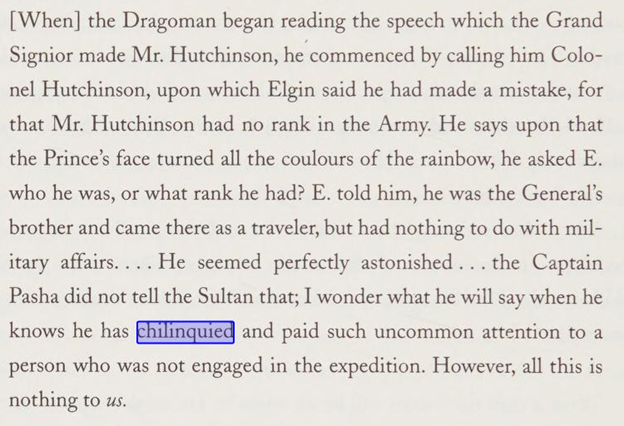I recently was asked about a mysterious word, chilinquied, by a reader of the Phrontistery who found this word in a letter from Mary Nisbet (wife of Lord Elgin) and published in her 2001 biography by Susan Nagel:

The context is Nisbet’s time with her husband while they were in Constantinople, as guests of (I believe) Sultan Selim III, around 1799-1801.
It’s not a typo – Google Books shows that ‘chilinquied’ is in the 1928 edition of Nisbet’s letters as well (The letters of Mary Nisbet of Dirleton, countess of Elgin), but in literally no other source I can find. Not one book, article, or website. Not in the OED, or any specialized dictionaries, or any of my other sources. A true hapax legomenon. It could have been mis-transcribed from the original letter, of course, which I don’t have access to, or it could be Nisbet’s spelling of … well, just about anything. So what could it be?
‘Chilinqui’ does seem to be part of a phrase ‘compañeros de chilinqui’ used in some Panamanian and South American websites, some sort of colloquialism – it sounds Quechuan. And ‘Chilinque’ is a surname in Brazil, it seems. But I reasoned (correctly) that this must all be a coincidence – nothing to do with a 19th century Scottish noblewoman visiting Constantinople.
Given the context of Elgin’s Ottoman ambassadorship, I considered that angle to be the most likely. It seemed to mean ‘honored’ or ‘acknowledged’ or something like that. If it were Anglo-Indian I’d go to my trusty Hobson-Jobson, but this would be Ottoman, not Indian – so presumably from Turkish or Farsi (or Arabic at the outside).
But there you run into a problem. Practically every letter in ‘chilinquied’ could be different than in any putative source word, and Turkish was at the time principally written in Arabic script in any case. I don’t speak a word of Turkish or Farsi, and also had to consider that whatever this was could be specific to the time period or the Ottoman court.
I even took a quick tour through the Dictionary of the Scots Language, although most 19th century Scottish noblewomen would not be using Scots, certainly not in a letter otherwise in standard British English. I couldn’t rule it out, though – it was a letter home to her family – some familectal word shared only among close kin? But again, a dead end.
Ultimately my first instincts proved correct. In looking for ‘chilinqui’ and ‘chilinque’ in the Latin American context, it turns out that Lady Elgin also used a different ‘chilinque’ several times in her published letters. I was able to track down the full text of the 1926 version (thanks, HathiTrust!) and lo and behold, four instances of ‘chilinque’ in addition to the one ‘chilinquied’. The first instance of ‘chilinque’ was from a letter describing Christopher Hutchinson, the very figure who the Sultan had ‘chilinquied’. And the editor of Nisbet’s letters, Lieutenant-Colonel Nisbet Hamilton Grant (her great-grandson) usefully provided a footnote: “Chilinque or Aigrette. — An ornament, often of great value, fastened on to the turban.”
From there it was a quick dash to the answer: the Turkish chelengk (çelenk), an Ottoman military decoration bestowed for military merit, often worn as an ornament on the turban. Horatio Nelson was the first non-Ottoman to be awarded one, in 1798, by Selim III (see a photo of a replica below). Thereafter (Nisbet’s letter was from just after this point) the chelengk was granted to various visiting officials, including Hutchinson.

The key insight of Nisbet’s original letter, the one reproduced in Nagel’s biography above, was the revelation that Hutchinson was not a military official at all, but a lawyer, although he wore military garb in the hopes of being mistaken for an officer who had served (as Nelson had) in the Egyptian campaign a few years earlier. Bestowing the chelengk / chilinque on Hutchinson, so that he was “chilinquied”, was thus highly inappropriate.
In any event, ‘chilinquied’ appears to be Mary Nisbet’s own coinage, meaning ‘to bestow a chelengk upon’. Both ‘chilinque’ and ‘chilinquied’ are spellings unique to her as well, explaining why they don’t appear anywhere else. I had been fooled for some time by the ‘-quied’ ending into looking for a three-syllable word – if it had been ‘chilinqued’ I don’t think I would have spent quite so much time on the Spanish phrases.
And so, mystery solved, and another episode of Steve Goes Down a Rabbit-Hole Instead of Doing His Actual Work comes to a conclusion.

I seem to remember a chelengk being awarded to Captain Aubrey in one of Patrick O’ Brian’s nautical novels.
Yes, that seems to be right. Dean King’s book ‘A Sea of Words’, which is a dictionary / lexical companion to Patrick O’Brian’s work, has an entry for chelengk.
This is super interesting! Going down historical rabbit holes like this one are so fun to do. Especially when there is a mystery to be solved.
Thanks Steve!